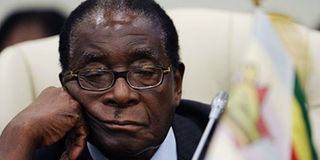STRAIGHT TALK : If violator of democracy is gone, we should celebrate

What you need to know:
Zimbabweans fought hard for their independence. When most African countries were being granted independence from colonialists in the 1950s and 1960s, white man Ian Smith hijacked Zimbabwe’s independence.
Zimbabwe has been in news. Formerly known as Southern Rhodesia during the British colonial rule and rebranded after independence, the country saw its president being held by military.
Zimbabweans fought hard for their independence. When most African countries were being granted independence from colonialists in the 1950s and 1960s, white man Ian Smith hijacked Zimbabwe’s independence.
Smith unilaterally declared that Southern Rhodesia had become independent under his leadership. Real independence was wrestled from the majority of downtrodden, impoverished Blacks.
Britain let go of its colonies as the ‘wind of change” was blowing across the continent as UK Prime Minister Harold Macmillan told Parliament in South Africa on February 3, 1960.
It was no longer possible to sustain colonialism ideologically and economically. But the main reason was that the peoples’ demand to unchain themselves from colonial shackles had growth.
Smith’s deception triggered a protracted war for independence in Zimbabwe, with leaders such as Joshua Nkomo, Bishop Abel Muzorewa and Robert Mugabe leading parties.
The war was really brutal, with loss of lives and properties. Leaders like Herbert Chitepo and Josiah Tongogara died mysteriously.
Mugabe, erudite with no less than seven university degrees mainly acquired while imprisoned by the Smith regime, waged an armed struggle. Zimbabwe won its independence in 1980 with Mugabe as its prime minister. He later became president and continued to cling tenaciously, ruling the country with an iron fist.
He mismanaged the economy, turning a prosperous country into not only into a poor one, but a pariah state. He seized farms of white Zimbabweans.
As a result, Zimbabwe, one Africa’s bread basket, became a beggar.
Economic cataclysm erupted, with the country’s currency becoming worthless as inflation escalated.
He suppressed the opposition and muzzled the freedom of expression. Activists went missing. The whereabouts of journalist Itai Dzamara are unknown and state officials deny that he was abducted.
Mugabe has been accused of rigging elections. In the 1980s his North Korea-trained security forces were accused of unleashing reign of terror in Matabeleland, killing no fewer than 20,000 people.
Recently, his government enacted draconian laws to silence dissenting voices. People were picked up in raids on accusations of insulting Mugabe on platforms such as Twitter as it happened to US citizen Martha O’Donovan who was recently charged with attempting to overthrow the Zimbabwean government after she called Mugabe a “sick and selfish man.” A convict of such an offence is jailed for up to 20 years.
Despite his disdain for democracy, Mugabe once chaired the African Union and played a role in the Southern African Community.
His wife Grace became a force to reckon with in the Zimbabwean politics, attacking even then-Vice President Emmerson Mnangagwa, who was later sacked.
Zimbabwe used to have a loyal army. Even with what has happened, most people do not regard it as a rogue army, but rather an attempt to save the country from becoming ungovernable. Time will tell if this was really the intention or making known that Mugabe has really overstayed.
It is a pity that some African leaders are crying hoarse that the constitution is being breached in Zimbabwe, ignoring that Mugabe has been blatantly violating democratic principles. This is tragic.
That is why, whatever the outcome, some of us are happy that at least, be it the army or the people lead the revolution, despotic rulers have no chance in Africa, even if their leadership is obtained through the ballot, especially when the election is stolen.




